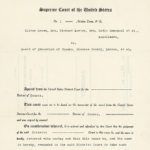For this high school Socratic Seminar, students will be asked to examine various readings and videos on public health and the rule of law and then explore the question “What role does the law play in protecting our health?” Encourage students to be prepared, participate actively, use evidence, listen carefully, and ask thoughtful questions of their peers throughout the seminar. There are resources to explore several public health examples (e.g., clean water, coal dust, COVID-19) included in this seminar guide, so feel free to select one or more, and adapt to your needs.
IRL 1: Free Speech in Schools Podcast
We’re digging into four incredibly important Supreme Court cases – four cases that have shaped how we interpret the meaning of free speech in public schools. Is political protest allowed in class? Is lewd speech covered by the First Amendment? Can school administrators determine what students can and can’t say in the school newspaper? Listen in, and find out how students and schools have gone head to head over how First Amendment rights apply in a public school setting.
Congress Investigates – Virtual Exhibit
The power to investigate, implied by the U.S. Constitution, is one of Congress’s most important tools for developing effective public policy, conducting oversight, and informing the public. Congress has investigated issues throughout its history via formal investigations and fact-finding inquiries with wide-ranging results, often significantly affecting the history of the United States.
Brown v. Board of Education Lesson Collection

On May 17, 1954 the Brown v. Board of Education decision was made. This landmark Supreme Court decision declared that laws establishing separate public schools for black and white children were unconstitutional. The Brown v. Board of Education ruling overturned the Plessy v. Ferguson decision of 1896, which allowed state-sponsored segregation in public schools. To support teachers as they commemorate this important anniversary in their classes, the Share My Lesson team has selected a variety of free lesson plans, educational resources and classroom materials about equity, particularly in schools.
The Powers of Congress
In this lesson, students will learn about the powers of Congress, how they have evolved throughout history, and their impact on public policy. Students will view C-SPAN video clips to learn about the types of congressional power and apply that knowledge by developing strategies to improve the effectiveness of Congress.
Civics and Citizenship
Civics and Citizenship explores both the rights guaranteed to Americans as well as the attendant responsibilities that come with those rights. Ultimately, the unit culminates with students writing, producing, and sharing a Public Service Announcement that defines, shows, and advocates for civic engagement. The goal of the lesson is that students actively assume the responsibilities of an engaged and thoughtful citizen.
Local Politics: The Need for Compromise
This lesson examines the process of local decision making and its need for citizen input and compromise. Students simulate a local city/county council session and advise the council on public policy. Students are asked to consider the viewpoints of different citizen groups in order to reach a compromise that will benefit the entire community. This lesson can be used with a unit on local politics and can be adapted to reflect issues of compromise in your school or community. Free registration required to access the lesson plan.
Deliberation Materials: Gun Licensing
Should the federal government require licenses for gun owners and purchasers? This activity includes a deliberation reading and glossary, as well as accompanying handouts to give students additional information on the topic and to guide them through the deliberation process from planning to reflection. Deliberation teaches people how to discuss controversial issues by carefully considering multiple perspectives and searching for consensus. In preparation for deliberations, all participants read common, balanced background information on the issue. During the discourse, they offer arguments for each position on a contested public issue, first drawing from the text and then bringing in their own experiences.
House and Senate: What’s the Difference?
The United States Congress consists of two legislative bodies, the House of Representatives and the Senate. There are many similarities between these institutions. Representatives and Senators are directly elected by the public (see Capitol Visitor Center essay “Who Elects Our Senators?”). Passing legislation requires the agreement of both the House and Senate. There are chambers for both in the U.S. Capitol. Given these commonalities, are there really differences between the House and Senate?
Provide for the General Welfare – Interstate Highway and Defense Act
In the Constitution, Congress is charged with providing for the general welfare of the country’s
citizens. Historically, this has meant improving transportation, promoting agriculture
and industry, protecting health and the environment and seeking ways to solve social and
economic problems. In 1956, Congress passed the Federal-Aid Highway Act, popularly known as the National Interstate and Defense Highways Act, authorizing federal funding for the extension and
construction of a robust network of interstate highways. This project was one of the largest public
works in U.S. history establishing key transportation infrastructure that impacted lives of all
Americans — changing communities, access and economic possibilities and also providing key
routes for evacuating urban centers — a critical national defense issue in the Cold War era.
Analyzing primary source material, students discuss the origins and reasons for the National
Interstate and Defense Highways Act. Then, they work with historical and contemporary maps
as they consider the impact this important congressionally funded project. While intended for 8th
grade students, the lesson can be adapted for other grade levels.